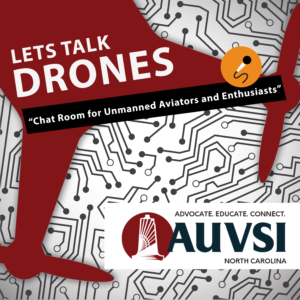 On the last Friday of every month, Darshan Divakaran and a team of experts from the North Carolina Chapter of AUVSI will host an open chat room for drone pilots and enthusiasts from all over the country. (It’s free, and open to all). DRONELIFE is proud to be a media partner for the event – if you can’t make it to the actual Zoom call, see our monthly column summarizing some of the discussion.
On the last Friday of every month, Darshan Divakaran and a team of experts from the North Carolina Chapter of AUVSI will host an open chat room for drone pilots and enthusiasts from all over the country. (It’s free, and open to all). DRONELIFE is proud to be a media partner for the event – if you can’t make it to the actual Zoom call, see our monthly column summarizing some of the discussion.
This month, a panel of experts from the AUVSI NC chapter covered topics from RID to local ordinances and rumors about new hardware developments.
Remote ID for Drones
Some of the top stories in DRONELIFE during the month of May got the grouop started: and the FAA RID Industry Cohort was one of them. This month, the FAA named 8 companies as technology developers who will collaborate on a framework for an intitial Remote ID application. Airbus, AirMap, Amazon, Intel, One Sky, Skyward, T-Mobile, and Wing were the companies named: FAA later clarified that the companies are not going to be involved in the decision making on the remote ID rulemaking, just developing the technology.
Questions from the audience included why drones couldn’t use ADS-B, the same solution as is used by airplanes: but Divakaran commented that for technical reasons “ADS-B has not been a great solution for all drones.” Other questions addressed the need for new hardware, and privacy concerns. Panelists answered that the Rulemaking allows for a 2 year grandfather period for current hardware. While privacy is a concern – drone pilots don’t necessarily want anyone to be able to access their personal information – panelists said that one likely solution is to offer pilots an option of a unique identifier that is not necessarily immediately identifiable to the public, such as a string of numbers. Much like a license plate number, a link to a name and address is not instantly available.
Regulations
Local regulations cause a problem for many drone pilots, but the panelists point out that the biggest issue for any flyer is knowing that state and local regulations exist. “Local ordinances cause problems, but launch and recovery is the biggest issue,” panelists explain. “For example, in N. C., you cannot launch and land on state property. Knowing what the local rules are is the biggest challenge to the user -as the operator of the drone, it’s always your responsibility to know the rules.”
Chat Room Chat
A great discussion on drone delivery (yes, it’s happening soon) ended with one participant making the best comment of the evening: “I can’t wait for a drone to deliver a drone to me.” (We can’t either). And in the well represented area of public safety drone programs, experts said that a new release from CA-based Skydio is promising great things for the public safety market.
Finally, AUVSI NC made the point that they are actively looking for more people – both from North Carolina and from surrounding areas. The chapter is expanding their programs, and reaching out to public safety departments to try and help them to integrate drones. They want to collaborate, partner and spread.
For outreach and education, Let’s Talk Drones is a great start. Join the conversation on the last Friday in June!

Miriam McNabb is the Editor-in-Chief of DRONELIFE and CEO of JobForDrones, a professional drone services marketplace, and a fascinated observer of the emerging drone industry and the regulatory environment for drones. Miriam has penned over 3,000 articles focused on the commercial drone space and is an international speaker and recognized figure in the industry. Miriam has a degree from the University of Chicago and over 20 years of experience in high tech sales and marketing for new technologies.
For drone industry consulting or writing, Email Miriam.
TWITTER:@spaldingbarker
Subscribe to DroneLife here.







[…] last week’s “Let’s Talk Drones” chat room, the audience got to see an end-to-end Flytrex drone delivery: from the order, placed on a phone […]